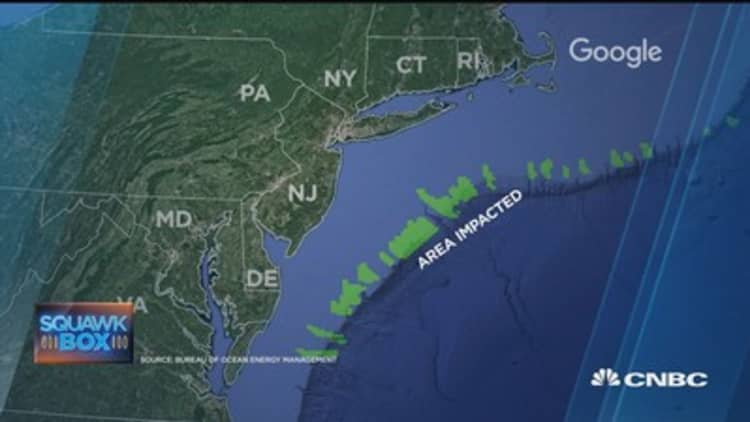President Donald Trump is expected to take action on Friday to open more offshore areas to oil and gas drilling, in part by reversing his predecessor's attempt to permanently protect large swaths of U.S. waters.
The president plans to sign an executive order instructing Interior Department Secretary Ryan Zinke to review and in all likelihood throw out President Barack Obama's plans for federally administered waters.
The reversal will not come overnight. Bureaucrats must grind through a multiyear process to overturn Obama's plans, and the executive action tees up a widely anticipated legal battle over executive authority.
Here are three paths Trump can take — and the challenges to each.
Rewrite Obama's offshore drilling plan
Trump's easiest and least controversial option is to create a new five-year plan for auctioning off blocks of the U.S. Outer Continental Shelf, the parts of the ocean and seabed under federal jurisdiction. This happens regularly when a president takes office.
The Obama administration in November excluded blocks in Pacific,
Under the Outer Continental Shelf Lands
Overturn Obama's 'indefinite' offshore drilling bans
Trump is also likely to challenge Obama's use of an obscure provision of the OCSLA to indefinitely block drilling in much of the U.S. Arctic off Alaska's shores and parts of the northern Atlantic Ocean.
The Obama administration cited provision 12(a) of OCSLA, which states, "The President of the United States may, from time to time, withdraw from disposition any of the unleased lands of the outer Continental Shelf."
Here's the hitch: That provision does not explicitly allow future executives to reverse their predecessors' action. The administration essentially made a bet that a judge would determine Trump can't override Obama's effort to permanently withdraw the areas from lease auctions.

Opponents of Obama's ban counter that Trump's authority is likely implicit: By giving the president authority to withdraw blocks of land, OCSLA likely allows another executive to put them back on the table.
The upshot is Obama's strategy is a novel interpretation of provision 12(a) that has never been tested in the courts. If a judge determines Trump doesn't have the power to overturn Obama's ban, the Republican-held Congress could amend OCSLA to spell out that authority.
Work with Congress to boost drilling
Lawmakers could play another role: Congress has the ability to open offshore waters for auction outside the OCSLA process.
On the surface, this looks like the easiest path forward, given Republican control of the White House and Congress. Indeed, Alaska GOP senators Lisa Murkowski and Dan Sullivan earlier this month introduced legislation to allow drilling in areas of the Beaufort and Chukchi seas that Obama put off limits.
However, attempts to lease blocks off the coast of the Pacific and Atlantic oceans and in the eastern Gulf of Mexico have faced stiff opposition in the past, including from local communities concerned about other industries like fishing and tourism.
Scheduling lease auctions through legislation can also open a can of worms, according to Tommy Beaudreau, the first director of the U.S. Bureau of Ocean Energy Management.
It gives states an opportunity to negotiate for a bigger share of revenue from oil and gas production off their shores — an opportunity they do not have under the standard OCSLA process. The lease sale may then look less financially attractive to the federal government.
"Congressionally mandated lease sales tend to be pretty rare," said Beaudreau, now a fellow at Columbia University's Center on Global Energy Policy.
"They almost always get bogged down in revenue sharing," he said.


